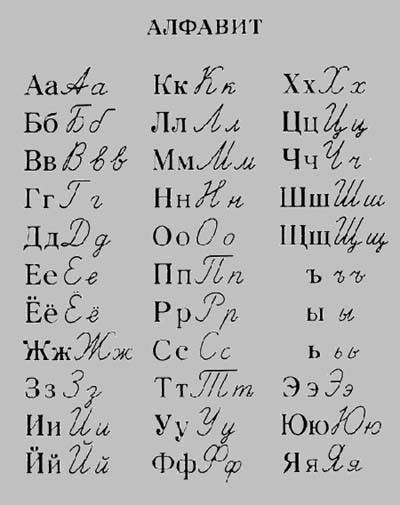| RUSSIAN LANGUAGE
Russian is the official language of Russia. It is also an official language of Belarus, Kazakhstan, Kyrgyzstan, an unofficial but widely spoken language in Ukraine and the de facto official language of the unrecognized country of Transnistria and partially recognized countries of South Ossetia and Abkhazia. Russian is one of the six official languages of the United Nations. Education in Russian is still a popular choice for both Russian as a second language and native speakers in Russia as well as many of the former Soviet republics.
Russian language, also called Great Russian, member of the East Slavic group of the Slavic subfamily of the Indo-European family of languages. The principal language of administration in the former Soviet Union, Russian is spoken by about 170 million people as a first language. It used by at least an additional 100 million as a second language in the countries of the Commonwealth of Independent States (the former Soviet Union) and of Eastern Europe. Closely related to Russian are the other East Slavic tongues, Ukrainian (also called Little Russian or Ruthenian) and Belarusian (or White Russian). The former is spoken by about 45 million people, mainly in Ukraine and Russia. The latter, which also uses a form of the Cyrillic alphabet, is the tongue of about 8 million persons, most of whom live in Belarus. Because of its large number of speakers and its leading position in the former Soviet Union, Russian is one of the chief languages of the world. Used officially by the United Nations, it is important in scientific writing as well. The great literary works written in Russian also have made the language culturally significant.
Despite leveling after 1900, especially in matters of vocabulary, a number of dialects exist in Russia. Some linguists divide the dialects of the Russian language into two primary regional groupings, "Northern" and "Southern", with Moscow lying on the zone of transition between the two. Others divide the language into three groupings, Northern, Central and Southern, with Moscow lying in the Central region. Dialectology within Russia recognizes dozens of smaller-scale variants.
The dialects often show distinct and non-standard features of pronunciation and intonation, vocabulary and grammar. Some of these are relics of ancient usage now completely discarded by the standard language.
Russian is written using a modified version of the Cyrillic (кириллица) alphabet. The Russian alphabet consists of 33 letters. The following table gives their upper case forms, along with IPA values for each letter's typical sound:

Economy of Russia ended 2008 with GDP growth of 6.0%, following 10 straight years of growth averaging 7% annually since the financial crisis of 1998. Over the last six years, fixed capital investment growth and personal income growth have averaged above 10%, but both grew at slower rates in 2008. Growth in 2008 was driven largely by non-tradable services and domestic manufacturing, rather than exports. During the past decade, poverty and unemployment declined steadily and the middle class continued to expand. Russia also improved its international financial position, running balance of payments surpluses since 2000. Foreign exchange reserves grew from $12 billion in 1999 to almost $600 billion by end July 2008, which include $200 billion in two sovereign wealth funds: a reserve fund to support budgetary expenditures in case of a fall in the price of oil and a national welfare fund to help fund pensions and infrastructure development. Total foreign debt is approximately one-third of GDP. The state component of foreign debt has declined, but commercial short-term debt to foreigners has risen strongly. These positive trends began to reverse in the second half of 2008. Investor concerns over the Russia-Georgia conflict, corporate governance issues, and the global credit crunch in September caused the Russian stock market to fall by roughly 70%, primarily due to margin calls that were difficult for many Russian companies to meet. The global crisis also affected Russia's banking system, which faced liquidity problems. Moscow responded quickly in early October 2008, initiating a rescue plan of over $200 billion that was designed to increase liquidity in the financial sector, to help firms refinance foreign debt, and to support the stock market. The government also unveiled a $20 billion tax cut plan and other safety nets for society and industry. Meanwhile, a 70% drop in the price of oil since mid-July further exacerbated imbalances in external accounts and the federal budget. In mid-November, mini-devaluations of the currency by the Central Bank caused increased capital flight and froze domestic credit markets, resulting in growing unemployment, wage arrears, and a severe drop in production. Foreign exchange reserves dropped to around $435 billion by end 2008, as the Central Bank defended an overvalued ruble.

In the first year of his term, President MEDVEDEV outlined a number of economic priorities for Russia including improving infrastructure, innovation, investment, and institutions; reducing the state's role in the economy; reforming the tax system and banking sector; developing one of the biggest financial centers in the world, combating corruption, and improving the judiciary. The Russian government needs to diversify the economy further, as energy and other raw materials still dominate Russian export earnings and federal budget receipts. Russia's infrastructure requires large investments and must be replaced or modernized if the country is to achieve broad-based economic growth. Corruption, lack of trust in institutions, and more recently, exchange rate uncertainty and the global economic crisis continue to dampen domestic and foreign investor sentiment. Russia has made some progress in building the rule of law, the bedrock of a modern market economy, but much work remains on judicial reform. Moscow continues to seek accession to the WTO and has made some progress, but its timeline for entry into the organization continues to slip, and the negotiating atmosphere has soured in the wake of the Georgia and global economic crises
For Russian-Chinese translation, Please contact us
|